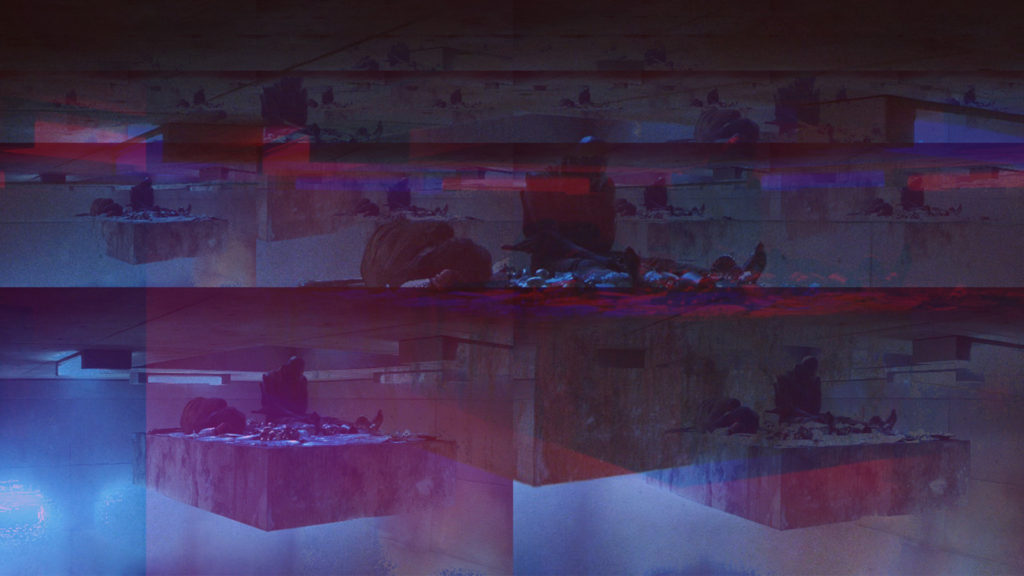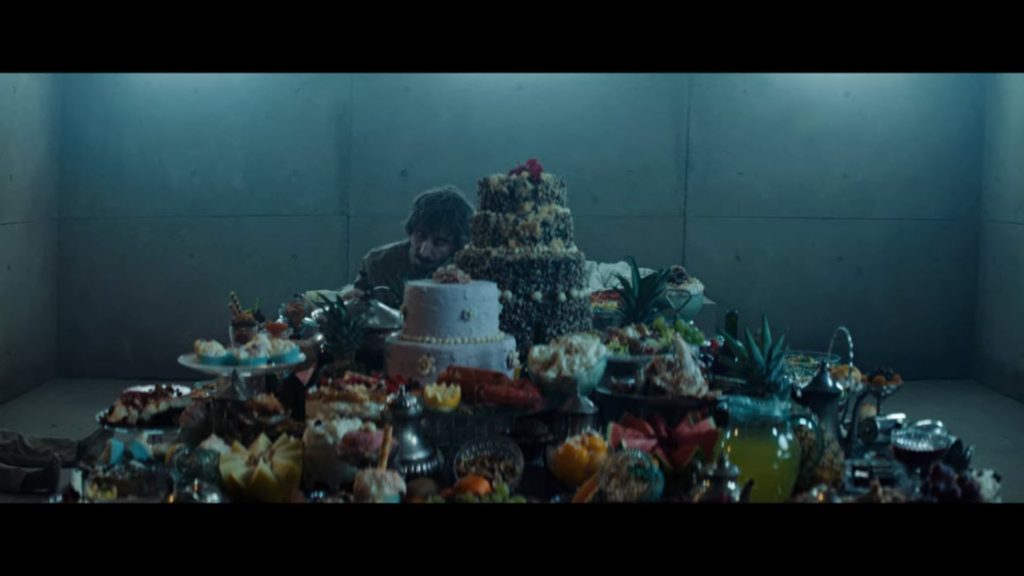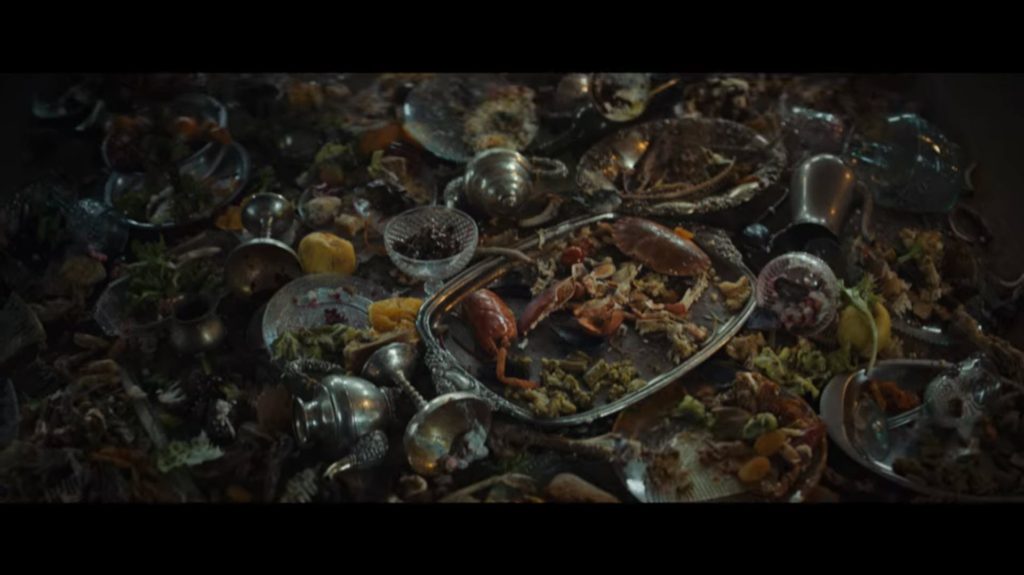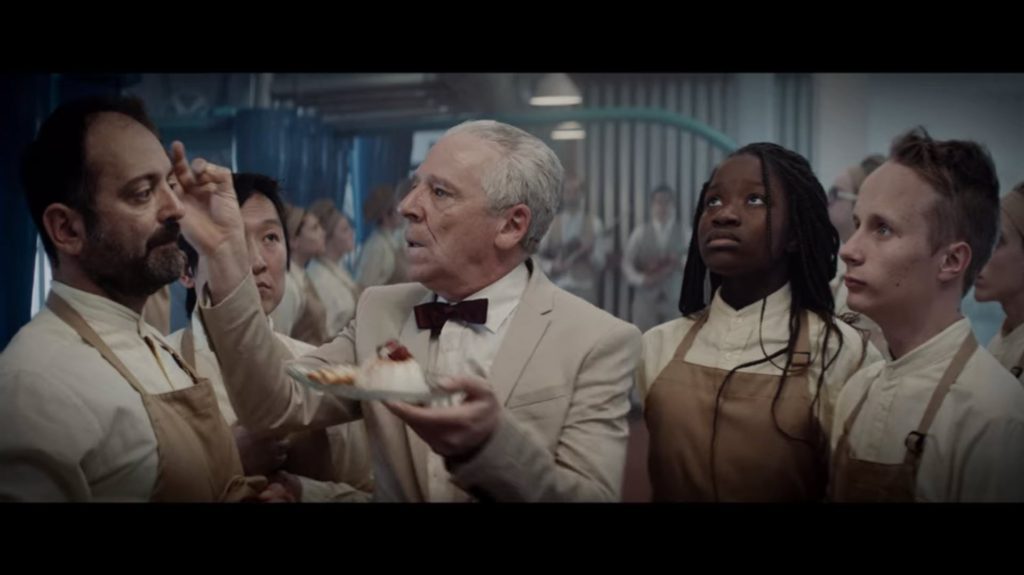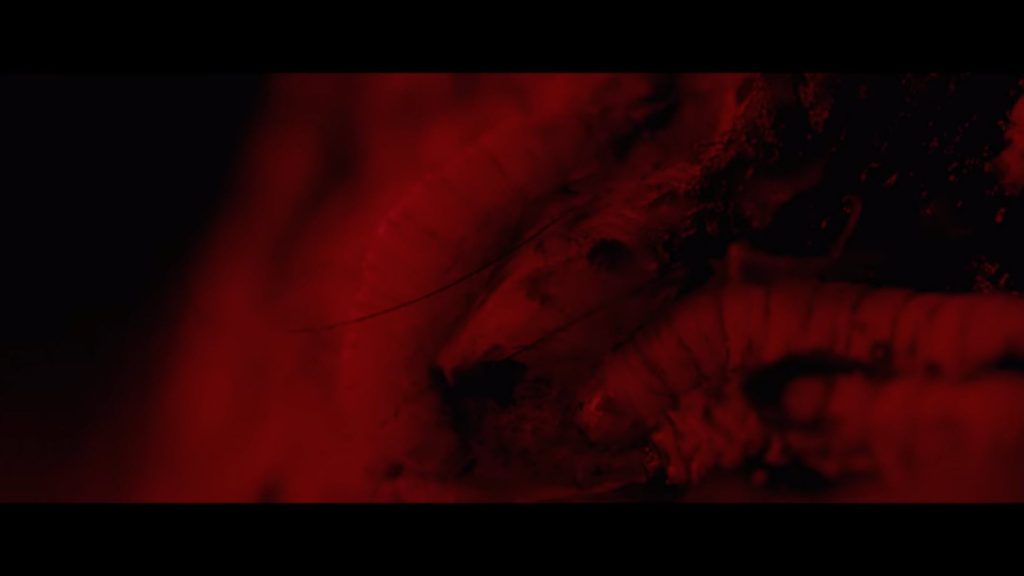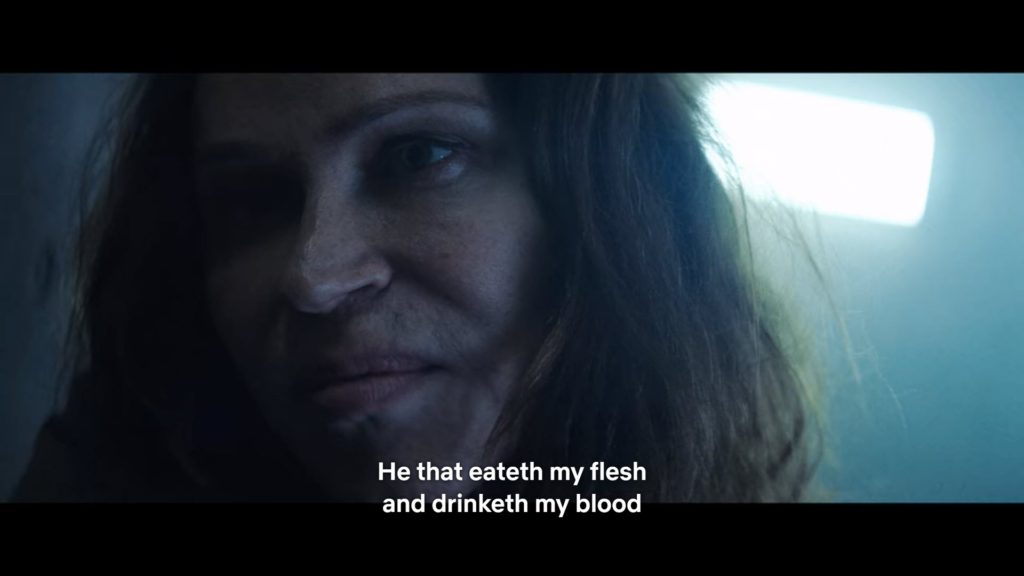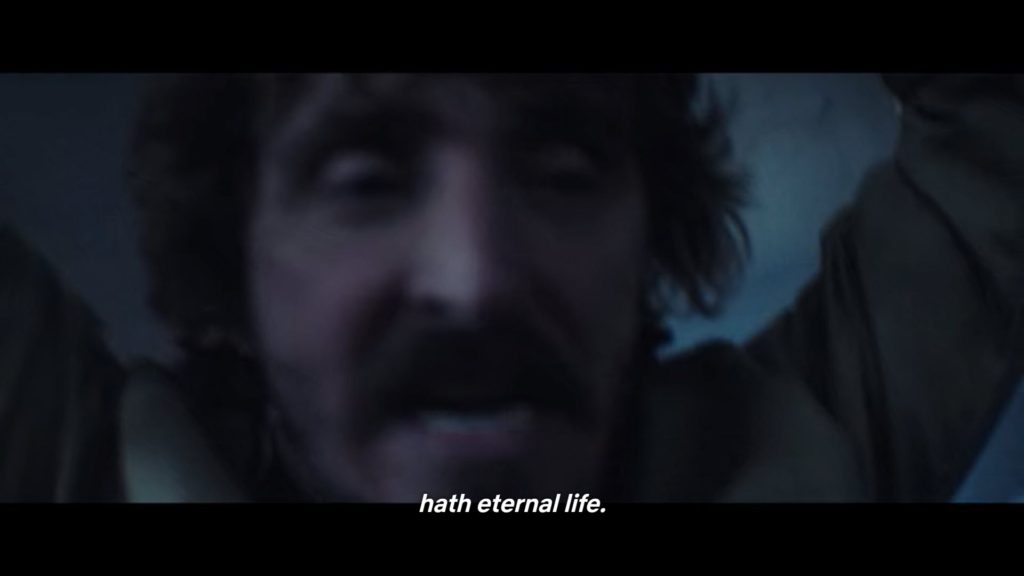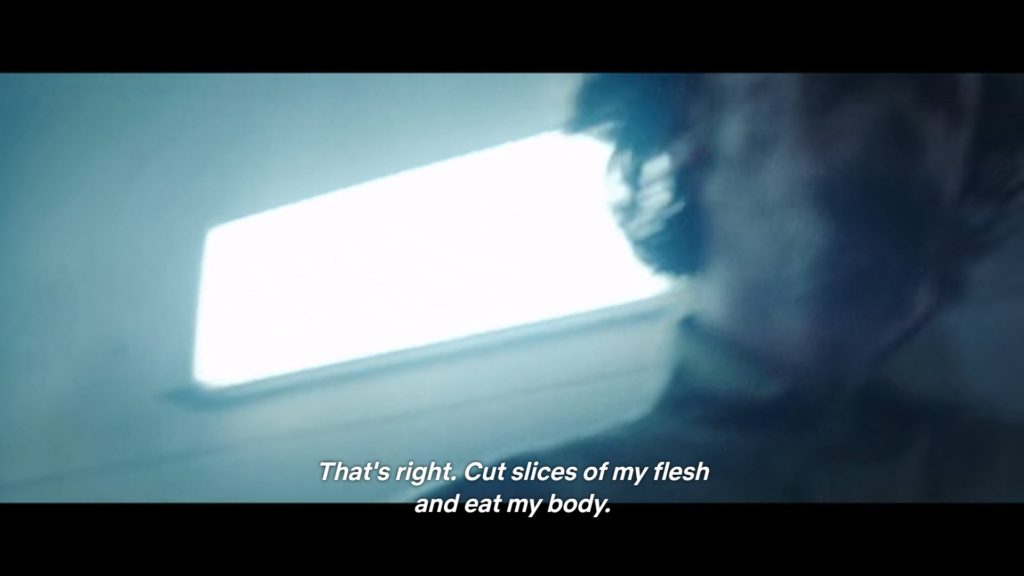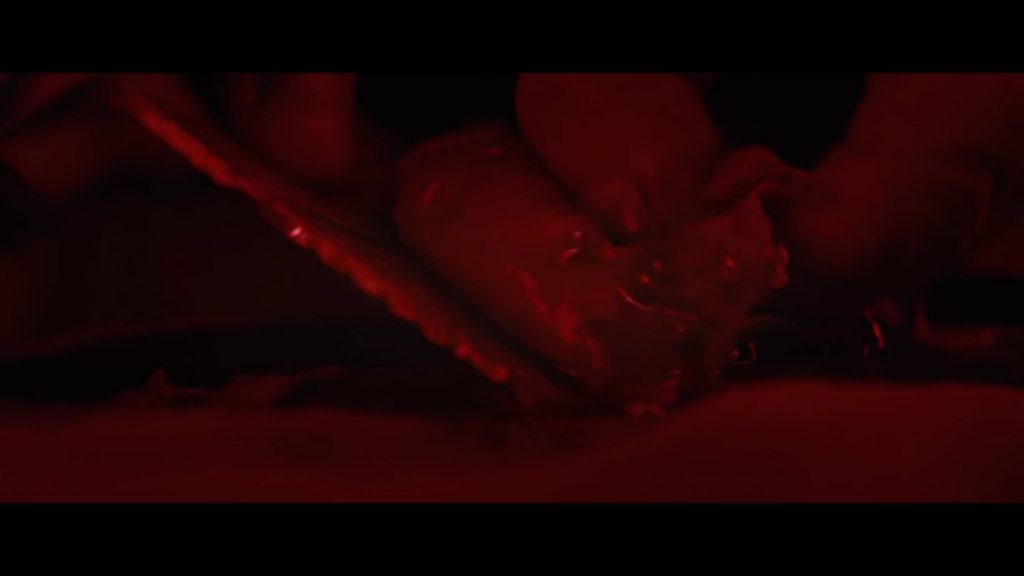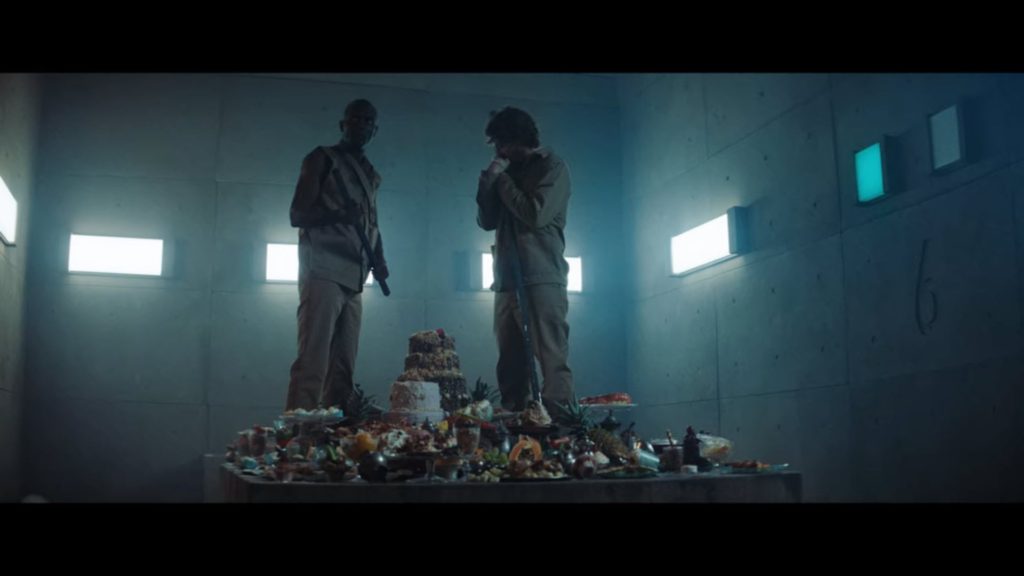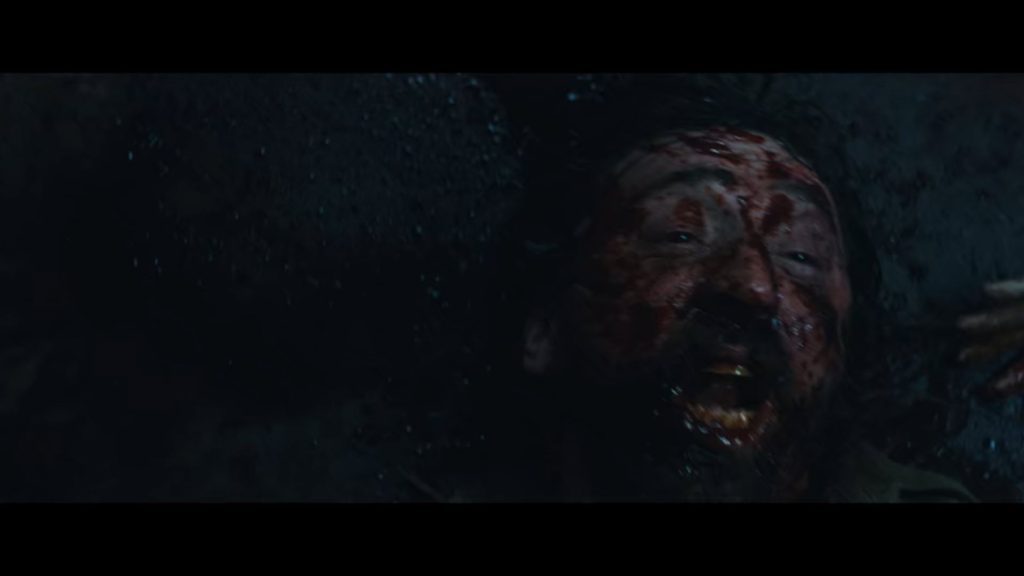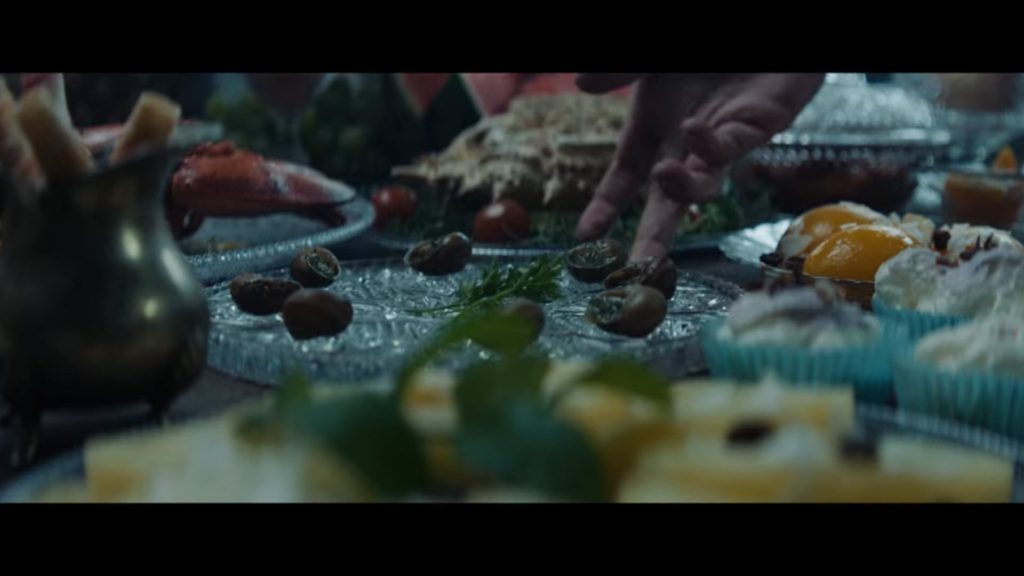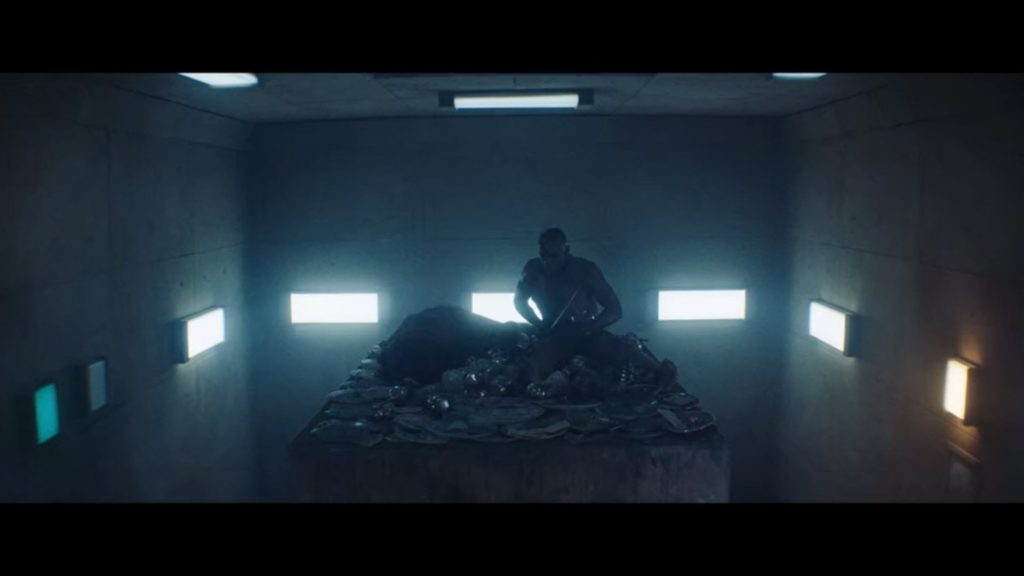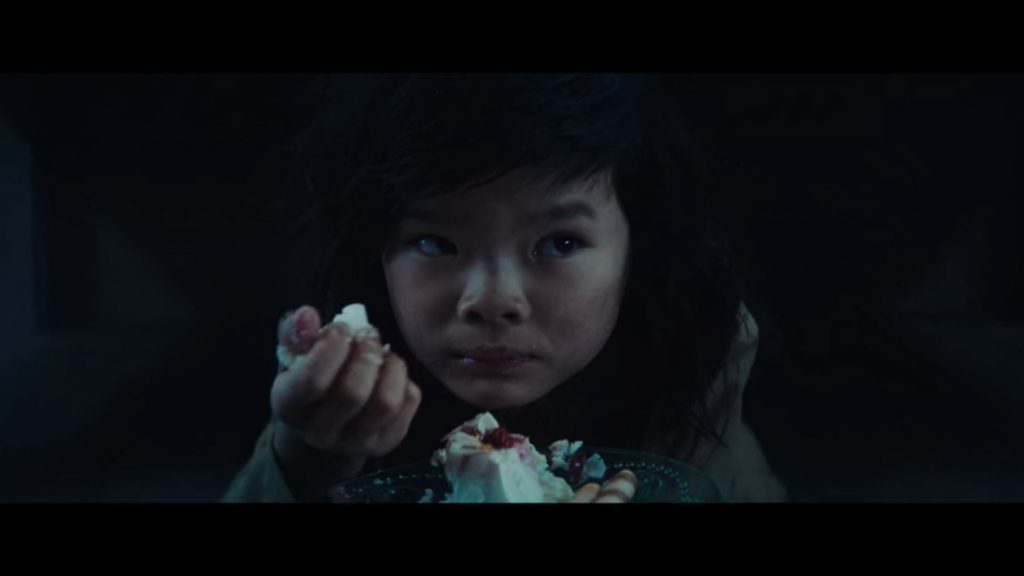WARNING: SPOILERS FOR THE ENTIRETY OF THE PLATFORM (2019)
Two men awake to discover they are trapped in a windowless concrete room; one a prisoner, one there by choice. A square pit plummets down into what looks like infinity. Once a day, a slab will lower containing a limited amount of food. They have only seconds to eat as much as they can before it descends. Not everyone gets to eat, you see. The further the titular platform descends, the more above eat, the less for the lower levels. It’s not a prison, it’s called the “Vertical Self-Management Center”, an amazing euphemism. It’s a fascinating, smart, dark scifi setup that feels like Harlan Ellison and Luis Buñuel had a lovechild abandoned at birth.
The world of The Platform, available on Netflix, is both mechanically simple and socially complex. You are randomly assigned a floor once per month, but may physically travel (if you can) between any of them, up or down. There are no guards and few rules, the main regulation being you can’t hoard any food whatsoever. Keeping even a single apple will trigger a fatal response from the room, killing you and your cellmate.
This movie is maximum metaphor, but rises above the superficial parable to be a compelling, disgusting, unbelievable experience. This is not for the queasy, as there’s more than enough cannibalism and gore to go around, and not a second of it is fun or campy. It’s grimly serious stuff, with some genuinely squeamish black comedy as its only levity. Every horrifying scenario is played out to its natural conclusion, refusing to give us an easy answer or packaged hero’s journey.
Galder Gaztelu-Urrutia’s debut joins a growing pantheon of movies critical of capitalism and the status quo with pulp genre skeletal structures; films like The Purge franchise, Ready or Not, Get Out, The Incident, Sorry to Bother You, and recent Best Picture winner Parasite to name a few (along with Bong Joon Ho’s Snowpiercer). They are unique in that they operate within a central visual or thematic metaphor and skew smart rather than surface. Scifi and horror are fertile ground for these topics, and they can get as speculative and weird as they need to.
The Platform’s main thematic core is a devastating exploration of the “tragedy of the commons”, meaning that people acting in selfish ways collectively will overexploit a natural resource, such as food. If there is no planning, no regulation, no common sense of social purpose, a group of individuals, even acting in self-interest, will devour the resource to depletion and then each other. The food platform can potentially feed everyone, but since the higher levels gorge themselves, the majority of the lower levels go hungry, pushing them to drastic cannibalistic measures.
Cannibalism is present in the film in body and spirit. This is a social system consciously designed to produce conflict and death, and the lower levels consuming each other literally represents the lower economic strata in capitalism being forced into impossible choices. There’s some stellar, mindboggling sequences where the kitchen staff that prepares the meal meticulously crafts exquisite dishes that will be torn apart by filthy, grabby hands. The head chef scolds his staff for a single hair being present in a dessert. Below, prisoners are slicing hunks off flesh off each other.
Prisoners are separated by floors, but they can communicate with each other above and below. This is where the movie genuinely goes from clever but heavyhanded concept piece to genuine incisive brilliance. The people trapped within the literal hierarchical system, a microcosm of the brutal hierarchy of capitalism, physically can’t communicate, cooperate, express solidarity, or engage in any sort of collective action due to the anxiety of their situation.
A newly arrived prisoner Goreng, our POV character, is immediately horrified at the brutality on display and initially refuses to eat, then does eat, then attempts to reform the system. He has volunteered to enter the Vertical Self-Management Center in order to get an “accredited degree”, which sounds like he entered the worst student debt arrangement imaginable.
Speaking for the status quo is Trimagasi, an older racist who fully embraces the system and its self-centered inevitability. Armed with an As-Seen-On-TV butcher knife, he is cynical and callous, speaking in a smug tone. He’s the True Believer in the system, or at least that the system cannot be changed, only survived.
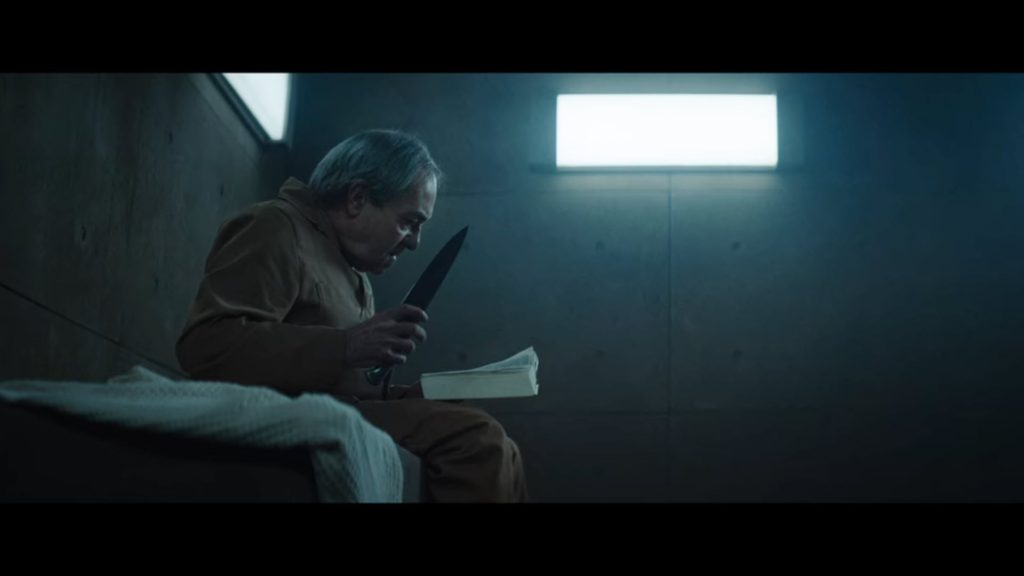
It’s important to remember that in this bizarre prison, you are randomly assigned a level. Going from a starvation level 70 to say, 7, would feel like a miracle. Next month, you could suddenly be thrust back into a dire survival situation and therefore feel no obligation to save any for others. They didn’t save any for you, you think. This is about you, not them. You’re lucky, they’re not, and since you can’t see them, out of sight, out of mind. This feels shockingly familiar to the old adage “fuck you, I’ve got mine” that springs from a society built on impersonal competition.
The film’s central conflict is between reform and revolutionary action. You can beg and plead all you want, but until you actually take direct action, nothing will change. Just like now, we do not need charity, we need solidarity.
A new month, a new a former member of the Administration (the management class of this hell), Imoguiri, arrives and attempts to make others voluntarily ration food for others. She is more informed than Goreng, and begs and pleads with the lower level to only eat a small amount that would, in fact, allow them to survive to the next day. It’s a rational and heartfelt argument, and predictably, completely ineffective because she’s appealing to the voluntary altruism of people who are in a life-or-death situation who feel lucky to be alive.
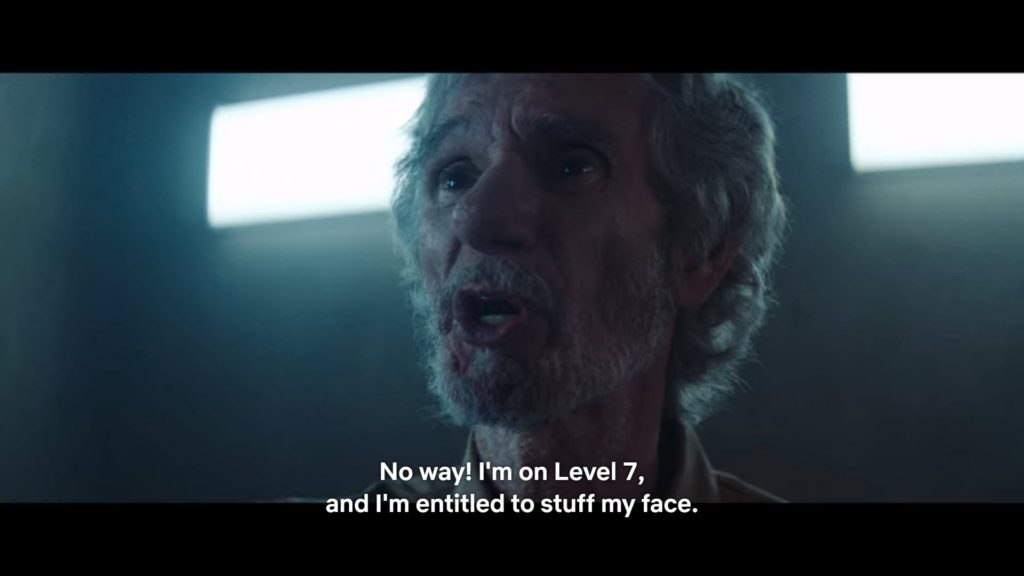
Imagine how you feel everytime a liberal goes on TV and pleads that we should all be doing more for the needy when you are in fact the needy one. You are not the one causing the hardship in the first place, you are its victim. Let’s say you came into a little bit of money after a stretch of desperate poverty and then someone meekly pleaded with you to give most of it away. You’d probably ignore them and feel resentful you are being asked to sacrifice even more.
Goreng scolds the people below to only eat a rationed portion to save food for others by threatening to shit in all the food. The threat somewhat works. Imoguiri wonders why he doesn’t tell this to the people above.
Goreng wryly says, “Because I can’t shit upwards.”
Cannibalism in the film serves several purposes: it shows the lengths people will go to survive, but also shows how the system is designed to produce this result intentionally. The oblivious nature of the cooking staff, who delicately plate immaculate dishes, who take care in their craft and presentation, is smashed up against people who couldn’t care less. The curls of drizzle on a panna cotta are absolutely irrelevant to a starving person, just like how the presentation of our suffering is given more care and attention in the form of complicated tax credits and overproduced commercials for charity than to the actual solving of poverty.
The flesh of a person in this place is a type of currency, it can be a gift given or precious commodity taken. Even our main character resorts to not one, but three, acts of cannibalism. You’re fully contained within capitalism, no windows, no way out, trapped, and your only recourse is a dwindling set of terrible options. You are forced to consume each other or die, because someone arbitrarily decided it to be so.
An actual revolutionary appears. Baharat, another prisoner, is initially attempting to escape via a rope, pathetically climbing slowly upwards, rising and grinding, until he is defeated by a floor above him literally shitting in his face. The upper class doesn’t like competition from below.
He and Goreng decide to form a 2 person vanguard party by physically enforcing rationing as they travel downwards. They beat off people with metal poles to only take what they need. Solidarity can’t happen naturally or voluntarily, so it must be imposed with a language a half-starved, irrational people will understand: a smash to the face. A cynical take, but I appreciate that the film doesn’t shy away from it.
A single fancy dessert is saved as a “message” for the Administration as they descend a staggering 333 levels to the very bottom. You have no idea how horrifying it gets, just 200+ levels of sheer murder and insanity. Most kill themselves out of despair when they realize their predicament. It’s the hidden world of violence, gallons of blood and piles of gore, people with little to no options savagely destroying each other. A handful eat well, the rest are left with scraps or nothing at all, left with a ravaging hunger.
In the very last room, there’s a child. The daughter of the insane woman Mali travelling the floors. She’s real. She’s somehow alive. They give her the precious dessert to save her life and then send her up the platform. Now she is the message. The hope is the staff of the kitchen will somehow see their plight and act. The film is a mix of optimism and cynicism equally; that change can happen, but it is uncertain and faces nigh-insurmountable odds.
The Platform is about how a system designed to only serve the top impoverishes us all. Those who miraculous transcend upwards never look back, and the rest of us are left to fight each other for the morsels left over. Starving, we are left to consume each other while a posh head chef, ignorant of the suffering outside of his kitchen, inspects escargot to make sure they are the highest of quality.
Carl Wilhoyte is the co-editor and co-founder of Zero Balance. His work has appeared in Street Fight Radio, District Sentinel, Abomination Magazine, Bourbon Penn, and Farmhouse Magazine.

